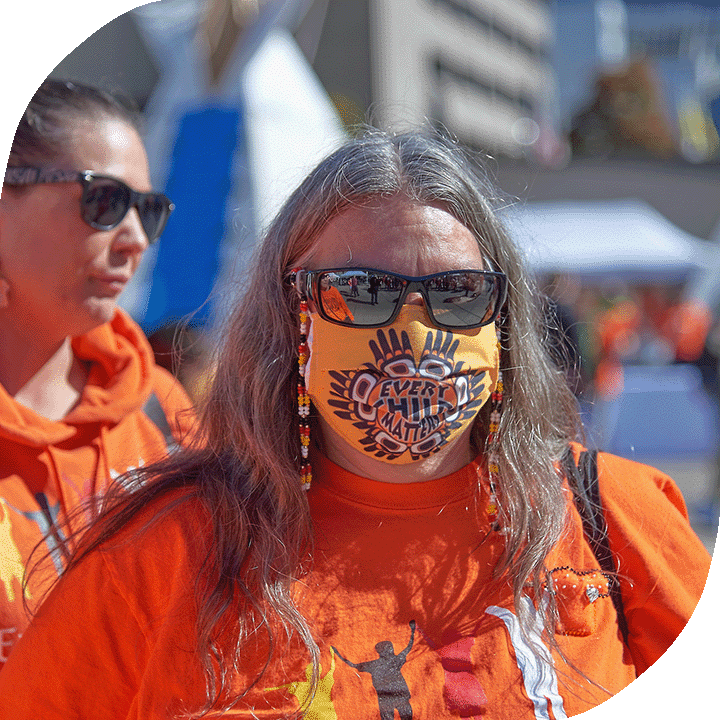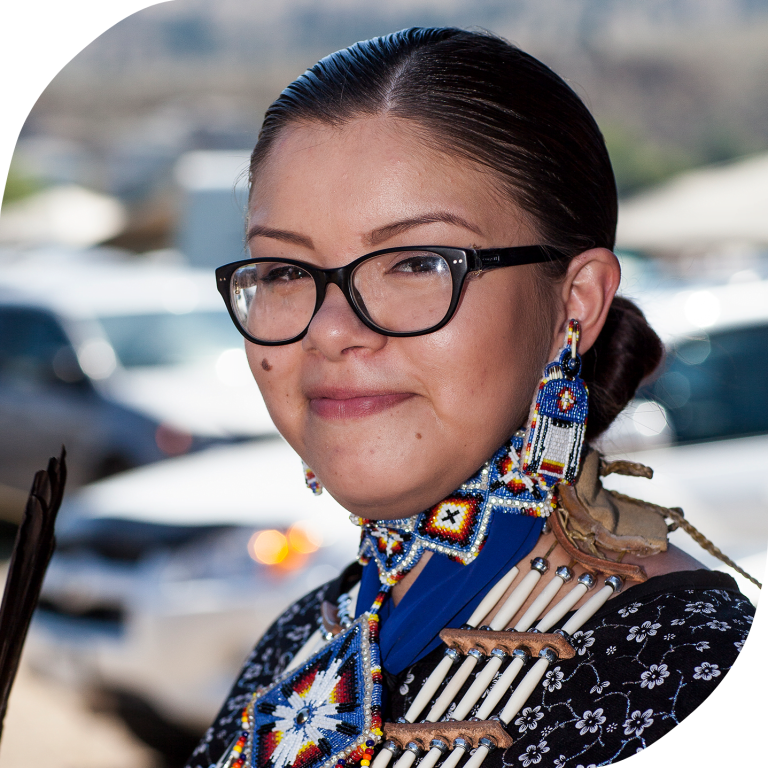What is decolonization?
Decolonization is the dismantling of the process by which one nation asserts and establishes its domination and control over the land inhabited by another nation, as well as over their people and culture. It is the framework through which we are working toward undoing the oppression and subjugation of Indigenous Peoples and unlearning colonial ways of thinking and being.
What we’re doing
Our Office is committed to listening deeply to Indigenous Peoples, supporting self-determination of Nations and working to dismantle structures that impede the full, equal and just participation of Indigenous Peoples in all aspects of economic, social, cultural and political life. We are committed to cultivating right relations with the Indigenous Peoples on whose lands our work is situated.
Transforming the human rights system
Decolonization is one of BCOHRC’s grounding approaches (the analytical frameworks that guide how we do our work). Key principles include:
- equality and non-discrimination
- listening, learning and honouring Indigenous worldviews, including the value of reciprocity and working in relationship
- self-reflecting as a mechanism to expose systems of bias
- recognizing and addressing intergenerational trauma as a direct result of colonization
- recognizing and supporting self-determination, including the right to govern under their own laws and legal orders
- dismantling or transforming laws and institutions designed to oppress Indigenous Peoples and Indigenous ways of knowing and being
- restoring a respectful relationship to land
A decolonizing approach to human rights requires us to recognize both collective and individual rights and responsibilities. It applies the Four ‘Rs’ to building respectful relationships: reciprocity, reflexivity, responsibility and relevance.
Learn more about our goals, desired outcomes and example focus areas relating to decolonization in our strategic plan, Rising to the challenge: Path to 2030.

Adding Indigenous identity to the Human Rights Code
Beginning early in her first term, the Commissioner had been calling on government to amend B.C.’s Human Rights Code to include a prohibition against discrimination on the basis of Indigenous identity. This was done alongside Indigenous leadership and the Human Rights Tribunal.
In November 2021, government introduced and passed Bill 18, which changed the Code to explicitly include Indigenous identity as a protected ground. This marked an important step on the journey to transforming B.C.’s human rights system to make it more inclusive and accessible to Indigenous Peoples—but there is much more to be done.
Given the overrepresentation of Indigenous people living in poverty, the inclusion of social condition as a protected ground is also essential to ensuring that the human rights system reflects and includes the experiences of Indigenous people. As the Commissioner stated, “Given the overrepresentation of Indigenous people living in poverty, the inclusion of social condition is also, in my view, essential to ensuring that the human rights system reflects and includes the experiences of Indigenous people.” BCOHRC continues to advocate for this addition to the Code.

Other highlights
The following is a sample of our work relating to decolonization. We encourage you to read our annual reports (accessible via our Publications page) to learn more about the work we have been doing on this priority.
Advancing the Grandmother Perspective
In September 2020, BCOHRC released a report titled, Disaggregated demographic data collection in British Columbia: The grandmother perspective. The “grandmother perspective” is an approach to data collection offered by Gwen Phillips of the Ktunaxa Nation, a B.C. First Nations Data Governance Initiative Champion, who proposes decision makers collect only the information needed to nurture communities, to be able to say, as Elders might, “we need to know because we care.”
In November 2020, the B.C. government accepted the almost all the recommendations in the Grandmother Perspective report and made a commitment to develop and introduce data legislation, which was later done through the Anti-Racism Act and Anti-Racism Data Act. Our recommendations are also reflected in the B.C. government’s Declaration on the Rights of Indigenous Peoples’ Act (Declaration Act) action plan, where action 3.14 is to “advance the collection and use of disaggregated demographic data, guided by Indigenous data governance, and support the establishment of an Indigenous-governed and mandated regional data centre and alignment with the Data Governance Strategy.”
To continue to spread awareness of the report, we host public webinars on data collection and the grandmother perspective. These webinars support people in working with the concepts in the report to strengthen data collection, storage and use in service of systemic equality. Find details about upcoming webinars via our Events page.
Applying UNDRIP in B.C.
A key focus of our decolonization work is monitoring the implementation of the Declaration Act—that is, the legislation that brought the UN Declaration on the Rights of Indigenous Peoples (UNDRIP) into B.C. law.
For example, the first litigation testing the application of the Declaration Act was heard in the BC Supreme Court in April of 2023 in the joined cases of Gitxaala Nation v. Chief Gold Commissioner of B.C. et al. and Ehattesaht First Nation v. His Majesty the King in right of B.C. et al. In both cases, the Nations sought a review of the process used by the provincial government to grant mineral claims on the territories of First Nations. They argued that the Declaration Act provides a legal right for First Nations to be consulted before claims are granted.
As an intervenor in the case, the Commissioner argued that the Declaration Act is human rights law and, like any other piece of human rights legislation here in B.C., it must take primacy over other kinds of statutes like the Mineral Tenure Act and be interpreted broadly and purposively.
Learn more and find up-to-date information via our Cases page.
What we know
Despite making up only 10 per cent of the population, 68 per cent of children and youth in care in B.C. are Indigenous.1
The 2023 point-in-time homeless count found 40% of people experiencing homelessness identified as Indigenous, despite Indigenous people making up only six per cent of the population.2
Four in 10 Indigenous women, two-spirit, transgender and gender diverse people in Canada report that perceptions of their identity (i.e., cultural or gender identity) have a negative impact on their ability to access housing that meets their needs.3
Life expectancy is substantially shorter for Indigenous people. For example, First Nations men live to an average of 72.5 years compared to 81.4 years on average for non-Indigenous men, amounting to a lifespan 11 per cent shorter.4
- “Performance Indicators: Services to Children in Need of Protection,” Ministry of Child and Family Development, accessed June 25, 2024, https://mcfd.gov.bc.ca/reporting/services/child-protection/services-to-children-in-need-of-protection/performance-indicators; “Indigenous identity population by gender and age: Canada, provinces and territories, census divisions and census subdivisions, Table 98-10-0293-01,” Statistics Canada, last updated November 15, 2023, https://www150.statcan.gc.ca/t1/tbl1/en/tv.action?pid=9810029301.
- Homelessness Services Association of BC, James Caspersen, Stephen D’Souza, and Dustin Lupick, Report on Homeless Counts in BC: 2023 (BC Housing, 2024), 49, https://www.bchousing.org/sites/default/files/media/documents/2023-BC-Homeless-Counts.pdf.
- Native Women’s Association of Canada. National Survey of Indigenous Women, Two-Spirit, Transgender and Gender Diverse people Summary Report. 2023, 19. https://nwac.ca/assets-knowledge-centre/2023-2339-NWAC-HousingPopulated-Report-FINAL-With-tabulations-Nanos-20230615.pdf.
- Michael Tjepkema, Bushnik, T and Bougie, E, Life expectancy of First Nations, Métis and Inuit household populations in Canada (Statistics Canada, 2019), https://www150.statcan.gc.ca/n1/en/pub/82-003-x/2019012/article/00001-eng.pdf?st=2ADaQp7a1.
